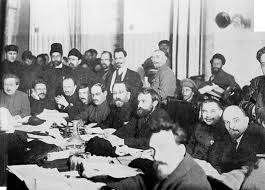Bolshevik
英 [ˈbɒl.ʃə.vɪk]
美 [ˈboʊl.ʃə.vɪk]
- n. 布尔什维克;泛指共产党员;激进分子
- adj. 布尔什维克的;布尔什维主义的;激进的
星级词汇:

记忆方法
将“Bolshevik”拆分为“Bo”和“lhevik”。想象一个“Bo”的人(可能是一个虚构角色或角色原型)因为某种原因(“lhevik”可能代表“暴力”或“极端”的力量)而变得非常强大或者具有领导力,就像历史上的布尔什维克党一样。通过这样的联想,可以更容易地记住这个单词及其含义。
以上内容由AI生成, 仅供参考和借鉴
中文词源
Bolshevik 布尔什维克
来自俄语,指多数派,列宁建立的俄罗斯大党。词根bel, 强,大,同multitude.
英语词源
- bolshevik
-
bolshevik: [20] Russian bol’ shévik is a derivative of ból’ shiy, the comparative form of the adjective ból’ shoy ‘big’. It was originally applied, at the 1903 congress of the Russian Social Democratic Party, to those party members who wished to go for a ‘big’, or extreme, socialist programme (in contrast with the more moderate Mensheviks – from Russian mén’ shij ‘less’); but since the Bolsheviks outnumbered the Mensheviks, the word soon became interpreted as ‘those in the majority in the party’. The transferred use of the English abbreviation bolshy to mean ‘stubbornly uncooperative’ dates from around 1918.
=> debility - Bolshevik (n.)
- 1917, from Russian bol'shiy "greater," comparative of adjective bol'shoy "big, great" (as in Bolshoi Ballet), from Old Church Slavonic boljiji "larger," from PIE root *bel- "strong" (cognates: Sanskrit balam "strength, force," Greek beltion "better," Phrygian balaios "big, fast," Old Irish odbal "strong," Welsh balch "proud;" Middle Dutch, Low German, Frisian pal "strong, firm").
It was the faction of the Russian Social Democratic Worker's Party after a split in 1903 that was either larger or more extreme (or both) than the Mensheviks (from Russian men'shij "less"); after they seized power in 1917, applied generally to Russian communists. Bolshevism is recorded from 1917.
权威例句
- 1. Seventy-four years after the Bolshevik Revolution, the Soviet era ended.
- 在布尔什维克革命爆发的74年之后,苏维埃时代终结了。
- 2. The Bolshevik coup in October 1917 was the outcome of the transformation of Marxism into Leninism.
- 1917年10月发生的布尔什维克政变是马克思主义转变成列宁主义的结果.
- 3. Sakwa: 5.3 - 5.6 ( Liquidation of Kulaks , Dizzy with Success , Bolshevik - Leninist Opposition ).
- 6 ( 对富农的清算 、 茫然的成就 、 布尔什维克党中列宁主义者的反对 ).
- 4. Bolshevik Revolution, led by Lenin, overthrew Prime Minister Alexander Kerensky's government.
- 俄国布尔什维克在列宁领导下发动十月革命, 推翻了克伦斯基为首的临时政府.
- 5. The Committee's report and hearings were instrumental in fostering anti - Bolshevik opinion.
- 委员会的报告和听证会都有助于推进 反 布尔什维主义主张.
